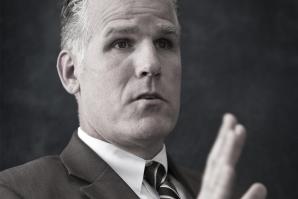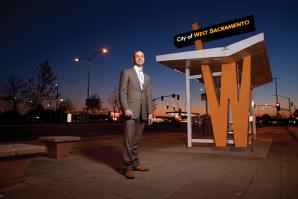After all these years since California voters passed Proposition 13, what will it take to have a rational discussion about amending the way commercial property is assessed?
For years, political organizations representing business have deemed Prop. 13 off the table. I believe this avoidance has occurred because a data-driven, factually-based discussion would reveal how unfair, irrational and counter-productive our current system is — even for business.
The good news is that the California Chamber finally decided to admit the obvious in the legislature this year: Yes, there are loopholes in the law. And yes, it may be to business benefit to provide for the most minimal of changes to this dysfunctional “change-of-ownership” law in order to put the issue to rest.
But the issue wont be put to rest, nor should it be.
The time has come for examination of the facts. In many years of discussion, I have never heard anyone argue that the loophole-ridden, change-of-ownership system makes any legal or policy sense. Nor, given the data weve examined, can Prop. 13 be defended on economic, fiscal or tax policy grounds. Perhaps most significant, our commercial property tax system is bad for economic growth and new development.
Since this seems counter-intuitive, lets break it down: First, the failure to reassess land to current market value allows valuable urban property to be held off the market with low-grade uses, leading to inflated land prices, speculation and sprawl. High land costs are one of the least attractive parts of Californias business climate. Investors want to put their money into buildings, equipment and labor, not sink it into inflated property values.
Second, those inflated land values are assessed and taxed at full market price, while competitors may be taxed at far less. Newly-constructed buildings are also assessed at full market value, as is business equipment. The business personal property tax — i.e., the annual property tax on all business equipment — is one of the most inefficient and troublesome taxes affecting business. In short, our commercial property tax system loads taxes onto new investments while failing to tax the windfall benefits to current property owners. That’s bad economics.
Third, one of the biggest complaints about California’s business climate is the convoluted regulatory process. Thats not just because of environmental regulations. Local government has to squeeze every last dollar out of the new investor/developer in the form of fees, exactions, mitigations and easements because the benefits of new development are not captured by our current property tax system. Plus, local citizens see the costs of growth but not the benefits, increasing anti-growth attitudes.
Finally, the current system short-circuits infrastructure finance. Infrastructure improvements are one of the most important things a local government can provide for business. Infrastructure is fundamentally a public investment in the carrying capacity of the land and should be financed by capturing revenue from increasing land values, as redevelopment did.
We have been researching the data, which is all publicly available. Assessed land values on comparable land in Silicon Valley range from less than $2 per square foot to more than $100 per square foot. In Los Angeles, it is not uncommon to find assessed land values in some areas ranging from $40 per square foot to nearly $600 per square foot. Chevron, for example, has owned many of its service stations since 1975, and is often assessed on its land at one-tenth its competitors’ rates. We have mapped assessments throughout the state, and in virtually every neighborhood you can see an inexplicable patchwork of benefits and burdens, irrational inequities that represent losses for our cities, counties and schools.
What kind of change might make sense? It turns out that the largest disparities are in land, not buildings, because buildings are reassessed upon improvement or have otherwise been allowed to depreciate. As a thought experiment, consider a “smart roll.” Bring those very old land values up to market rate, and reassess the land regularly while eliminating the business personal property tax for small businesses. At our 1 percent rate, cities, counties and schools would capture a small share of that revenue, reflecting the improvement in the local economy. That would be a good economic growth policy easily implementable by assessors and would eliminate the use of loopholes that keep assessed land values at absurdly low levels. Such a trade-off would relieve 95 percent of businesses as well as the assessors who have to value business equipment in every office, restaurant, store and small industrial property in the state.
Change after 40 years inevitably requires a discussion of how to make the transition, looking at what difficulties and hardships might occur and what other related policy changes might be appropriate. But first we have to decide to take up the discussion and examine the system in depth. Are there some business folks out there willing to engage the issue? If so, lets begin that now.
Recommended For You

Underhanded Dealings
The dark side of the “shadow economy”
Unscrupulous vendors are a small part of the so-called shadow economy – the unlicensed contractor for sure, but also a vast black market of businesses, often cash-only, working out of homes or garages, that don’t pay the taxes or licensing fees their competitors do. While profitable for the person getting away with it, this underground economy hits all of us right where it hurts – in the pocketbook.

Happy National Estate Planning Awareness Week!
But before the party starts, here are 7 questions you need to answer
If National Estate Planning Awareness Week, which started yesterday, snuck up on you this year, you are not alone. In fact, if you don’t have an estate plan, you have lots of company. Fifty percent of Americans lack a will and other vital estate planning documents, and their absence is a sure path to probate court and often lengthy, costly legal proceedings before an estate is settled.

Realign. Redevelop.
Counties director Matt Cate thinks California is righting its course
No one can accuse Matt Cate of avoiding the hard jobs. During his four years at the helm of California’s state prisons, he guided the system through some of its toughest times, including historic budget cuts and the implementation of Gov. Jerry Brown’s controversial 2011 realignment plan, which shifted tens of thousands of offenders to local jails and parole supervision.

Small City, Big Vision
Acuity with Chris Cabaldon
There is nobody more bullish on the City of West Sacramento than Mayor Chris Cabaldon. He says no city in the region can boast of a better location and, perhaps most importantly, a better water supply. With these two key attributes, the mayor believes the west-bank city is well positioned to attract business, jobs and residents for the foreseeable future.




Comments
Mr. Goldberg:
Prop 13 is not the state's biggest financial issue. It certainly isn't the reason Occidental Petroleum, Toyota Fremont(mfg) & Torrance(hq), General Mills, Campbells, Fluor, &&& decamped.
CA. stinks! All I've seen in the papers is corruption, malfeasance, and stupidity all the way to the horizon. NY has 5 crime families. We have the 100's of agencies, contractors, and their employee unions. I would trade in a heartbeat.
Look at the high speed rail. $100 billion wasted- even as streets and local transit need money. Even CRF/Ca. Rail Foundation, a pro-railroad organization is against it. They're asking why we're 3x Europe per mile. Why the proponents projected more riders from Madera than AMTRAK Manhattan gets. Who is going to pay the same price as airfare for a slower trip with less origin and destination flexibility. No one explores the Elon Musk proposal that would slash costs and offer much greater speed and make America 1st in rail technology.
Why did & does our prison system cost 100 billion more every 10 years than Texas? Same # of prisoners - 160,000. If you read Dan Walters, he makes a good point: we underincarcerate. Ask why if Texas has 12 million less people they have the same number of inmates, and much lower recidivism. They don't say "we're cap'd out" and release folks. Ca, at 50k/inmate ... we ran out of money to run the system. And we are the worst of all 50 states in recidivism.
Look into the fudging of seismic maps and the resignation of the state architect ... who seemed to care little for the life of children
in schools. Read the story in California Watch. http://californiawatch.org/ear...
Look at the CPUC & Mike Peavey. Could have stopped San Bruno
and 8 deaths ... but chose to run the worst gas line inspection system of all 50 states(CA comes in last a lot), ignoring the NTSB fines and entreaties to clean things up. Then he hung on for years, with the help of Jerry Brown, as if it never happened. Cared little for the life of citizens.
Read Jaxon Van derBecken in SFGATE.
Pensions. Read Professors Crane and Rauh's assessment of of Calpers/strs. Pensions are a 1/2 trillion underwater in Ca. - worst of all 50 states? Or is it more? Any skeptics of pension fund failure should look up the NYTimes story on Prichard, Al. - their pension fund is EMPTY. Let's look into spiking- which the legislature said they reformed - but we found out it was only for new employees... it's great to know we'll cut costs in 30-40 years. How about Spike Helmick & Co. going after Art Acevedo for blowing the whistle on disability cheating; then our chief lawman lied to the State personnel board. That makes Ca. lower than the other 49 states too.
Look at all the construction project scams:
1. the Bay Bridge... billions in overruns for something of dubious safety. Duane Wiles fudged inspections- more than once, stole from Caltrans with his boss, was a child molester. Not fired.
2. The AOC courthouse construction projects - new building at 8x the price of rehab, whilst courts are closed and operating funds are
lacking. http://abclocal.go.com/kgo/sto...
3. Sacto will even steal from the special olympics crowd!
Read: California housing for developmentally disabled has high cost
By Jack Chang jchang@sacbee.com
Published: Sunday, Jan. 2, 2011 - 12:00 am | Page 1A
http://www.sacbee.com/2011/01/...
4. The plumbers unions fight dry plumbing in a state short of water, without considering the business they ignore if they were to retrofit
Ca. from top to bottom with waterless fixtures.
5. Local transit scams - rail systems built though busways, like Curitiba & Bogata, are 1/3 the cost. And a show stopper: 500 million for a 3 mile shuttle between Bart & Oakland Airport; truth is stranger than fiction.
Local governments with 600k pensions for city managers, 800k/yr mayor, 400k/sheriffs - on disability, $675k/yr deputy sheriffs. What a state !!! Let's reform prop 13 so we can pay for more goodies!
Being from Stockton there's been some real eye-openers - pay 25%
above market concealed by the add-pay scams. Life-time medical with no money put away for it? A 500 million default on that- victimizing retirees. The staff, the council, the auditors, the unions
all caught snoozing. Fireman get 182k while there's no money to replace old fire engines. Jerry says the budget is balanced and realignment dumps a guy in Stockton who robs, rapes, and murders his grandmother. And while we're on the unpleasant subject... what about all those rape kits that sat on the shelf while public employees got all those great salaries?
What about the tobacco settlement money - squandered to pay
for everything but it's original purpose.
http://www.propublica.org/arti...
The list is endless ...
Quote from Professor Crane: "We have a state of, by, and for the employees" .
Typical complaint of people - scatter gun approach to point out all the problems but no focus on the issue raised. Yes these are all legitimate problems but they can not be solved with whines and wishes. A starting point needs to be staked out and resolved. Once that problem is resolved, then the next one is chosen.
Prop 13 was the result of wild and thoughtless spending by local governments and while it reined in their stupid ways it also harmed many good programs Californians enjoyed. It probably needs to be revised as no one saw how the commercial property issues were going to go on for 40 years, we were all focused on home ownership at the time.
Whether or not one believes the data presented in then original opinion, it should be looked at and examined for factual presentation and a rational judgement formed and either implemented or dropped and the next issue judged. Yes, we are motivated by our personal biases and political views but unless we are willing to calmly discuss and value the other persons views, we will continue to do nothing but act in selfish interests.
Wild and thoughtless spending by California politicians still exists
today. The biggest mistake we made was making the State Legislature
a full time institution. These clowns make $179 thousand dollars a year!
Give me a break.